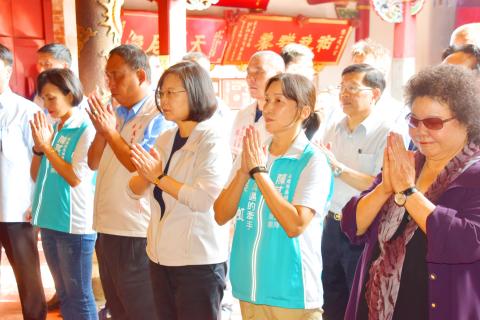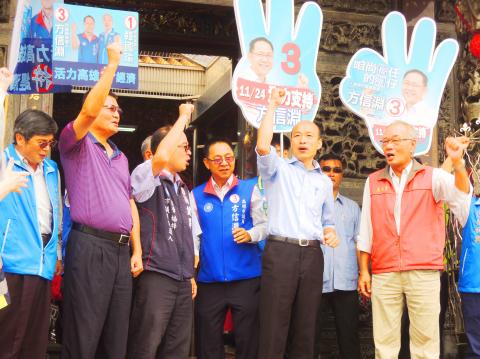President Tsai Ing-wen (蔡英文) promised to make Kaohsiung a base for the implementation of the Cabinet’s New Southbound Policy during a temple tour in the city yesterday.
The national government used to focus more on developing the north than the south, Tsai said during a visit to the Tianhou Temple in Kaohsiung’s Cishan District (旗山), adding that it had not given Kaohsiung enough resources.
The Democratic Progressive Party (DPP) government would make Kaohsiung the base from which it executes her administration’s New Southbound Policy, as well as an important center of technology development for the national defense industry, she said.

Photo: Su Fu-nan, Taipei Times
All the projects necessary to make the city a base have already been approved by the central government, Tsai said.
In addition, semiconductor maker Winbond Electronics Corp plans to invest NT$300 billion (US$9.76 billion) in Kaohsiung, she said, adding that it would be only the beginning of many more investments by high-tech companies.
Tsai was accompanied by Presidential Office Secretary-General Chen Chu (陳菊), who in April stepped down as Kaohsiung mayor to take up the post, Democratic Progressive Party Legislator Chiu Yi-ying (邱議瑩) and DPP mayoral candidate Chen Chi-mai’s (陳其邁) wife, Wu Hong (吳虹).

Photo: Wang Jung-hsiang, Taipei Times
They were greeted by supporters, who shouted “Go, President Tsai” and “Go, Chen Chi-mai.”
In a speech to supporters, Tsai said that she cares about the Nov. 24 elections and even more about Kaohsiung’s future, and her job as president is to work with Kaohsiung voters and help them obtain more support from the national government.
“Ever since I was elected president in 2016, I have been trying to bring development projects to Kaohsiung, so that young people would have more career opportunities and become an engine for the city’s development,” Tsai said, adding that Kaohsiung had undergone dramatic change under former DPP mayors Frank Hsieh (謝長廷) and Chen Chu, and has been recognized as one of the world’s most livable cities.
Tsai, the DPP chairperson, urged people to vote for Chen Chi-mai.
“We have come to the final 20 days before the election. Kaohsiung would pass up a great opportunity if it chooses the wrong person,” she said. “Chen Chi-mai is a talented person, whom the DPP has spent 20 years cultivating and who has extensive experience in politics.”
Meanwhile, Chinese Nationalist Party (KMT) Kaohsiung mayoral candidate Han Kuo-yu (韓國瑜) yesterday said that he looks forward to a debate with Chen Chi-mai in which they could present their visions for the city.
Han was responding to a call from Chen Chi-mai’s camp for a debate while campaigning in Yongan (永安) and Mituo (彌陀) districts, which have traditionally voted for DPP candidates.
Han said he was on good terms with the farmers when he was Taipei Agricultural Products Marketing Co president and never thought he would one day run for Kaohsiung mayor.
He vowed he would help farmers and fishers find buyers for their products.
The working class in Kaohsiung has had enough and is screaming for change and a better life, Han said, adding that people would use their votes to wake up Kaohsiung and create a better city.
Additional reporting by Chen Wen-chan

A strong continental cold air mass is to bring pollutants to Taiwan from tomorrow, the Ministry of Environment said today, as it issued an “orange” air quality alert for most of the country. All of Taiwan except for Hualien and Taitung counties is to be under an “orange” air quality alert tomorrow, indicating air quality that is unhealthy for sensitive groups. In China, areas from Shandong to Shanghai have been enveloped in haze since Saturday, the ministry said in a news release. Yesterday, hourly concentrations of PM2.5 in these areas ranged from 65 to 160 micrograms per cubic meter (mg/m³), and pollutants were

Taiwan’s armed forces have established response protocols for a wide range of sudden contingencies, including the “Wan Chun Plan” to protect the head of state, the Ministry of Defense (MND) said today. After US President Donald Trump on Saturday launched a series of airstrikes in Venezuela and kidnapped Venezuelan President Nicolas Maduro, concerns have been raised as to whether China would launch a similar “decapitation strike” on Taiwan. The armed forces regularly coordinate with relevant agencies and practice drills to ensure preparedness for a wide range of scenarios, Vice Minister of National Defense Hsu Szu-chien (徐斯儉) told reporters before a

EVA Airways on Saturday said that it had suspended a pilot and opened an investigation after he allegedly lost his temper and punched the first officer several times as their plane was taxiing before takeoff at Los Angeles International Airport. According to a report published on Thursday by The Reporter, the incident occurred after the flight’s Malaysian first officer tried to warn the Taiwanese pilot, surnamed Wen (文), that he was taxiing faster than the speed limit of 30 knots (55.6kph). After alerting the pilot several times without response, the first officer manually applied the brakes in accordance with standard operating

NOT AN OPENING: Trump’s violation of international law does not affect China’s consideration in attacking Taiwan; Beijing lacks capability, not precedent, an official said Taiwanese officials see the US’ capture of the president of Venezuela as a powerful deterrent to Beijing’s aggression and a timely reminder of the US’ ability to defeat militaries equipped with Chinese-made weapons. The strikes that toppled Venezuelan President Nicolas Maduro signaled to authoritarian leaders, including Chinese President Xi Jinping (習近平), US President Donald Trump’s willingness to use military might for international affairs core to US interests, one senior official in Taipei’s security circle said. That reassured Taiwan, the person said. Taipei has also dismissed the idea that Trump’s apparent violation of international law could embolden Beijing, said the official, who was not